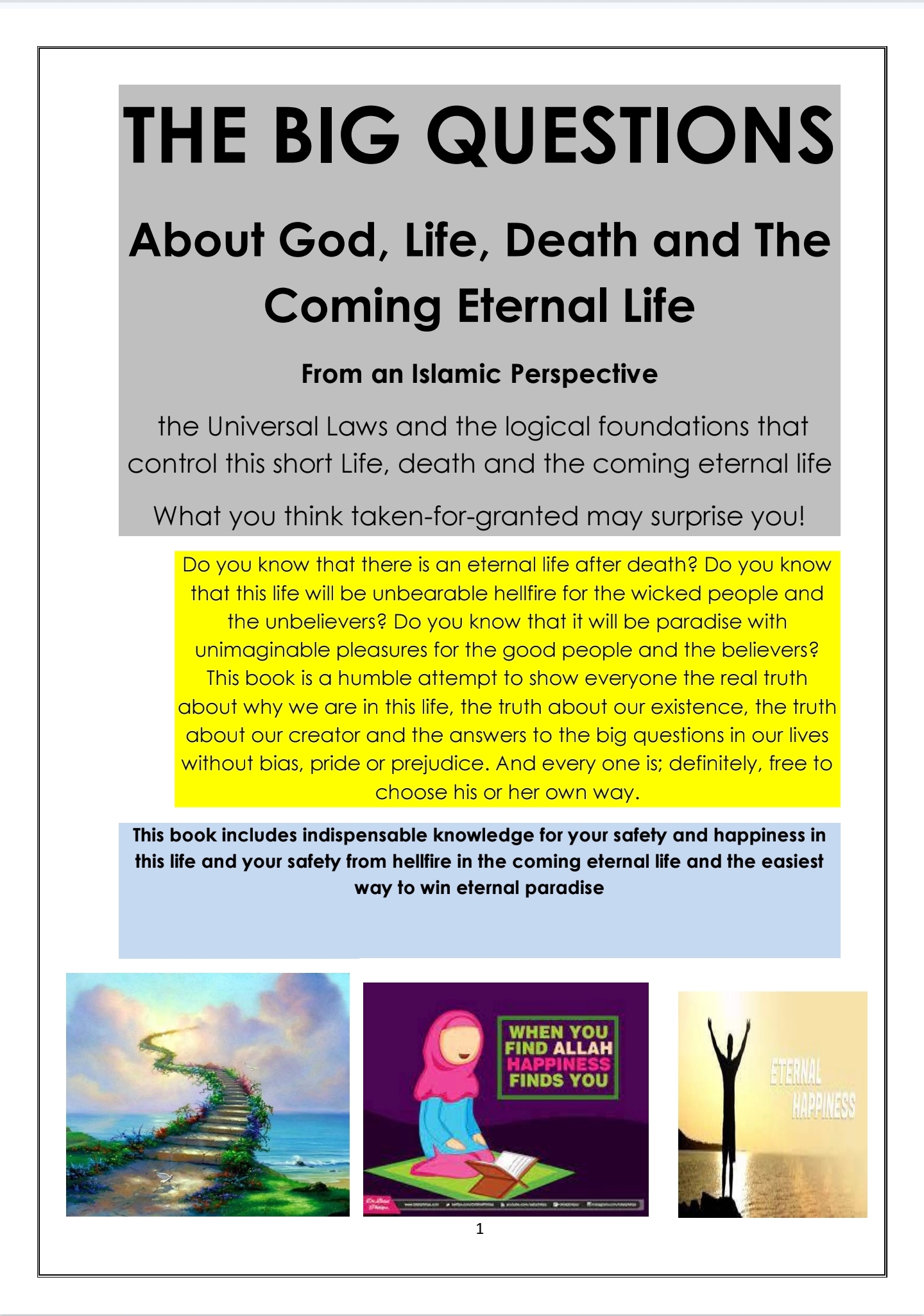Hub For Your Daily Islamic Insights 🕋 🕌

The Big Questions: About God, Life, Death and The Coming Eternal Life, Essential knowledge on faith, afterlife, and purpose from an Islamic perspective
Essential knowledge on faith, afterlife, and purpose from an Islamic perspective
Free
Discover answers to life’s most profound mysteries with ‘The Big Questions: About God, Life, Death, and The Coming Eternal Life’. This insightful book delves into essential topics such as the purpose of existence, the reality of the afterlife, and the nature of faith—all explored from an Islamic perspective. Presented with clarity and logical reasoning, each chapter empowers readers to contemplate their spiritual journey and prepare confidently for what lies beyond. Whether you seek deeper understanding or reassurance about eternal life, this book offers clear explanations and practical guidance. Printed in a convenient paperback format (6” x 9”), it’s perfect for personal study or thoughtful gifting.
In the tapestry of human existence, the subjects of God, life, death, and the promise of eternity have loomed large, weaving profound questions that have occupied the minds and hearts of countless individuals throughout history. From an Islamic perspective, these themes are not only central to faith but are also fundamental in framing one’s purpose in life and understanding the journey beyond. **The Concept of God in Islam** At the foundation of Islamic belief lies the concept of God, or Allah. Islam emphasizes the oneness and uniqueness of God (Tawhid), portraying Him as the sole creator and sustainer of the universe. Allah is described in the Quran not only as the all-powerful and all-knowing deity but also as a compassionate and merciful being who actively engages with His creation. Muslims understand God as being beyond human comprehension, yet intimately close to every individual, embodying qualities such as mercy (Ar-Rahman) and justice (Al-Adl). These attributes provide a framework for believers, instilling a sense of responsibility and purpose, as they navigate the intricacies of life. **The Purpose of Life** Life, in its essence, is seen as a test and a temporary phase of existence. According to the Quran, Allah created humans with the intention of worshiping Him (Quran 51:56), suggesting that fulfilling this purpose is key to a meaningful life. Muslims believe that every action taken in life should reflect one's intention to serve God, whether through prayer, acts of charity, kindness to others, or seeking knowledge. This perspective fosters a holistic approach to life, inspiring individuals to strive for excellence (Ihsan) in all endeavors while being aware of their moral and ethical responsibilities towards themselves, others, and the environment. **Understanding Death** Death is an inevitable aspect of human life and is regarded in Islam not as an end, but a transition to another realm of existence. The Quran asserts that every soul shall taste death (Quran 3:185), reminding believers to view death as a natural part of the divine plan. This understanding alleviates the fear often associated with mortality, as it is believed to be a passage to a more profound existence. Islam teaches that upon death, the soul enters a phase known as Barzakh, a barrier between the physical life and the afterlife. In this phase, the deceased is believed to experience a foretaste of what is to come, based on their deeds in life. This belief asserts accountability and reinforces the importance of living a righteous life in the pursuit of faith. **The Afterlife in Islamic Belief** The concept of an afterlife is pivotal to Islamic doctrine. Muslims believe that after the Day of Judgment (Yawm al-Qiyamah), individuals will be resurrected and held accountable for their actions during their earthly existence. This judgment will determine their place in the eternal realms of Paradise (Jannah) or Hell (Jahannam). The Quran offers descriptions of Paradise as a place of unimaginable beauty, peace, and eternal fulfillment, while Hell is depicted as a realm of suffering and regret. This dichotomy serves as a motivator for Muslims to adhere strictly to their faith, perform good deeds, and repent for sins. The principle of accountability encourages believers to view their lives as interwoven with the choices they make and the impact of those choices on themselves, their community, and their relationship with God. Thus, the afterlife is not merely a distant reality but a guiding force influencing daily behavior and decisions. **Faith in the Divine Plan** In Islam, faith (Iman) is paramount and is associated with trust in God's wisdom and plan. Believers find solace in the understanding that their lives are governed by Divine decree (Qadar). This belief fosters resilience, particularly in times of suffering or unforeseen challenges. When faced with hardship, Muslims are encouraged to practice patience (Sabr) and remain steadfast in their faith, reflecting the idea that trials serve as an opportunity for growth and a means to attain closeness to Allah. The notion of Divine mercy also plays a crucial role in Islamic faith. It is believed that God is always ready to forgive those who sincerely repent. This concept reassures believers that, despite their shortcomings, they can seek redemption and strive for a life that aligns with divine expectations. This cyclical process of sin, repentance, and forgiveness reinforces the importance of personal accountability alongside the profound mercy of God. **Conclusion: The Journey Towards Eternal Life** Ultimately, the journey of life, death, and the anticipated eternal existence is a profound aspect of Islamic theology that shapes the understanding of human purpose. Reflecting upon these concepts offers Muslims a framework through which to navigate life’s complexities with faith, conviction, and a sense of moral responsibility. In conclusion, by embracing the tenets of faith, performing righteous deeds, and maintaining a steadfast connection with God, believers are not only preparing for an afterlife but also finding purpose and meaning in their earthly existence. The questions surrounding God, life, death, and eternity are not mere philosophical quandaries; they are profound inquiries that invite every individual to embark on a deeper journey into understanding their purpose and the nature of their existence.
